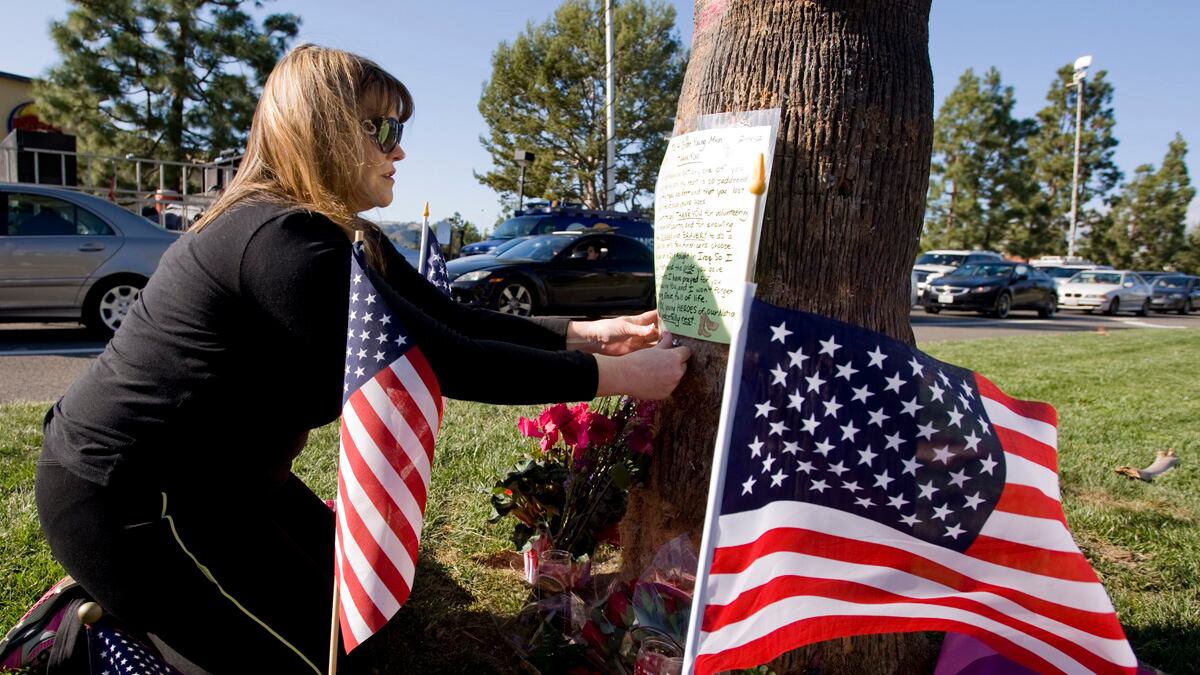On Wednesday, a Marine based at Camp Pendleton in Oceanside, Calif., was charged with three felony counts of vehicular manslaughter while intoxicated. Sgt. Jared Ray Hale, 25, was seriously injured in a Feb. 14 crash north of the base that killed three of his fellow Marines: Sgt. Jeremiah Callahan, 23, Cpl. Jason Chleborad, 22, and Cpl. Christopher Arzola, 21. According to police, Hale had a blood alcohol level of .16, twice the legal limit.

Prosecutors say Hale went to a bar in nearby Dana Point with his friends and three hours later was driving his Dodge Stratus on a residential street at a high rate of speed when his car crashed into a palm tree. Hale suffered traumatic brain injury, broken ribs, and a broken arm in the crash and remains hospitalized in a military hospital in Northern California. Prosecutors planned to ask that bail be set at $100,000, and an arraignment date will be determined later. Despite the level of alcohol police say they found in Hale’s blood, his attorney insists Hale was not drinking that night, and was in fact the designated driver for the group, who were his subordinates.
While drinking has always been a staple in the U.S. military, several high-profile incidents involving alcohol, as well as numerous studies, suggest that alcohol abuse has reached epidemic proportions among active-duty Marines, sailors and soldiers. Alcohol use is also reportedly present in a majority of military sexualassault cases. All of which begs the question: Is the military doing all it can to identify alcohol problems within the ranks and prevent alcohol-related tragedies from occurring?
In 2010, the Walter Reed Army Institute of Research surveyed more than 6,500 combat troops recently back from deployment to Iraq. More than 25 percent of the people anonymously surveyed “screened positive for alcohol misuse,” according to Debra L. Yourick, director of science education and strategic communications for the institute.
Compared with soldiers who screened negative, Yourick explained, those who screened positive were more likely to have recently engaged in drinking and driving, riding with a driver who had been drinking, reporting late or missing work because of a hangover, using illicit drugs, being referred to alcohol rehabilitation, or being convicted of driving under the influence.
Alcohol- and drug-related charges were involved in more than a third of all Army criminal prosecutions of soldiers in the two war zones — 240 of the 665 cases resulting in convictions, according to The New York Times.
And just days before the death of the three Marines in Dana Point, a former Camp Pendleton Marine, Andrew Stueber, was convicted of drunk driving in an August 2009 crash that killed another Marine and injured two others.
“Alcohol abuse in the active-duty military is a bigger problem now than I’ve ever seen before,” says Bill Rider, president/CEO of American Combat Veterans of War (ACVOW), a non-profit organization that provides a wide variety of services for active-duty military and combat veterans making the transition to civilian life. He tells The Daily Beast that many Marines “drink during the day now, while on duty. It’s become very common.”
Rider, a retired Marine and Vietnam combat veteran who is independent but has an office at Camp Pendleton as well as at the San Diego Department of Veterans Affairs (VA), calls the incident in Dana Point “tragic but not surprising. We see Marines with drinking problems here (at ACVOW) every day. This terrible situation reflects an absolute failure of leadership. All the branches have abdicated their responsibility and turned this problem over to mental health professionals, who don’t really have answers, either. They’re just taking shots in the dark as to how to control drinking in the military.”
Rider said many combat veterans self-medicate their post-traumatic stress and traumatic brain injuries with alcohol. “With these young men and women going out on so many deployments, and the stress of IEDs (improvised explosive devices), you see a lot of drinking, especially because they feel they don’t have anywhere to turn when they come back from combat,” Rider says. “The military has dropped the ball on this."
The Army certainly appears to have failed to recognize some glaring red flags with regard to Staff Sgt. Robert Bales, the soldier charged with gunning down 17 civilians in a pair of Afghanistan villages near a military outpost in Kandahar province in March. Bales reportedly showed risk factors for alcohol abuse, including violent behavior while drunk.
The New York Times, citing unnamed senior military officials, reported shortly after the killings that Bales had been drinking that night with fellow soldiers. In the years leading up to the rampage, Bales had five brushes with the law, and four involved alcohol, according to numerous media reports. These incidents include a 1998 citation for having alcohol on a Florida beach, a 2002 arrest for fighting with two casino security guards while drunk, a 2005 arrest for DUI, and a 2008 fight at a bowling alley where police reported Bales was “extremely intoxicated.”
Military bases do offer alcohol abuse counseling and treatment. Camp Pendleton, for example, has the Consolidated Substance Abuse Counseling Center. But as well-meaning and confidential as this center may be, many Marines remain reluctant to use these official military services because of the stigma attached to substance abuse and the fear that it could somehow negatively impact their military and post-military career.
All branches of the military already randomly test for illegal drug use, but alcohol, which of course is legal, has never been tested. Three months ago, Navy Secretary Ray Mabus announced an unprecedented plan to begin random alcohol tests of personnel on Navy and Marine bases, ships, submarines, etc. He said at the time that the testing would be a tool to identify sailors or Marines who may need counseling or treatment. Service members who tested positive for alcohol would not be allowed to go on duty, he said, but would not be penalized with a permanent record of the result.
According to the Navy Times, the Navy initiated its Breathalyzer beta test three weeks ago at 13 commands including the U.S. Fleet Forces Command (FFC) staff and 12 other units including the aircraft carrier USS George H.W. Bush. But apparently the Marine bases haven’t gotten on board as of yet.
First Lt. Alex Lim, a spokesperson for 1st Marine Division, the combat element of the Marine Expeditionary Force at Camp Pendleton, says "No randomized sobriety checks have begun to this point (at Camp Pendleton) that I'm aware of."
If and when these tests are initiated at Camp Pendleton, it won’t sit well with at least some Marines interviewed for this story who’ve suffered a decade of multiple deployments, problems with post-traumatic stress and traumatic brain injury, and more. One active-duty Marine who asked not to be identified says he opposes any effort by the Corps to do random alcohol testing on base.
The Marine, who’s endured several tours in Afghanistan, says, “If I have a few beers and then the next morning I’m on duty and they test me, alcohol could still be in my system and it could ruin my career. I’ve put my life on the line. Let me have a few beers for Christ’s sake. Last time I checked, drinking was legal.”
Jean White, a retired lieutenant colonel who saw heavy combat as a Marine in Korea and still works with Marines at Pendleton and veterans on a volunteer basis, is sympathetic with that Marine and says random testing for alcohol on a military base is “a slippery slope, it’s scary to me. In my opinion this is going to hurt morale even more. Having a drink now and then has been a way for a Marine to relieve stress.”
White adds, “A drink never hurt anybody back in the old Corps because most of it took place on the base. We used to go to a club after a long week and have that camaraderie over drinks. But the club was on the base. Now they have so many restrictions at the on-base facilities you can’t have more than a beer or two. So people go off the base, and that’s when they get into trouble.”
But White does believe that drinking in the military is out of control. Even the Army, which does not have any announced plans to start testing for alcohol, recognizes the problem. In March, Army Secretary John McHugh issued a directive in which he admitted that the current policies for alcohol and drug abuse rehabilitation were “not ideally suited to respond” to the problem.
McHugh’s revisions to criteria for drug- and alcohol-related separation from active duty include any soldier who is involved in “two serious incidents of alcohol-related misconduct within a 12-month period.”
Kathleen Brown, the wife of a lieutenant colonel in the Air Force and an executive at Alcohol Monitoring Systems, a company that manufactures ankle bracelets for repeat alcohol offenders, says neither random testing nor separation will solve the drinking problem in the military: “It’s not just drinking, it’s drug use, homelessness, and suicides. They’re all on the rise, they’re all related, and random alcohol testing won’t solve anything.”
Rider believes that what’s needed are more peer-to-peer advocates for service men and women. “We need to bring more people in who can talk to them, listen to them, gain their trust and help them in a safe environment,” he says. “Maybe these Marines dying in Dana Point could be a jump-off point, maybe it will send a message that leadership just isn’t doing enough.”
But Rider isn’t so sure things will change. With Marine recruitment enjoying a surge right now largely because of the economy, he says, “They’re just moving the damaged Marines out and bringing fresh young Marines in to take their place. They’re discarding the old for the new. It’s a disgrace if you ask me.”
Meanwhile, Hale’s attorney Bill Paparian insists that Hale, who faces a maximum 10-years in prison, is innocent of the charges and that the crash was caused by poor weather. “We have multiple witnesses, both Marines and civilians, who are emphatic that he was not intoxicated,” Paparian tells The Daily Beast. “I have a lot of questions about how they were able to legally obtain a blood sample from someone who was not arrested and who was unconscious. You can’t just withdraw someone’s blood. There was also heavy rain, and the accident occurred on a road that was notorious for hydroplaning. He’s a decorated combat veteran who served in Afghanistan, and he is entitled to the presumption of innocence. The state of his sobriety has yet to be adjudicated in a court of law.”
In a statement written by Hale after the accident and provided to The Daily Beast by Paparian, Hale said, “Everyday I’m faced with the overwhelming and insurmountable grief and loss of not just co-workers, fellow Marines, and friends, but the realization that my brothers are gone. I will never again have the pleasure of seeing them, hanging out with them, or turning to a single one of them when I feel like my very world is falling apart.
“They never allowed me to quit and I owe it to them now to work harder than ever before to not only overcome the obstacles that lay ahead,” Hale continued, “but to live my life for them and in their honor, and to live in such a manner that continues the honorable legacy we began as Marines, as friends, as brothers.”






